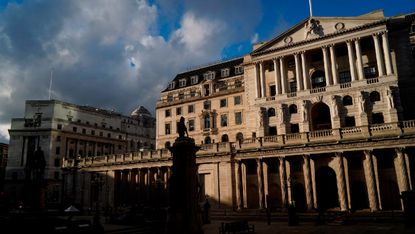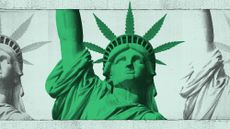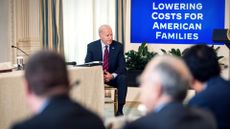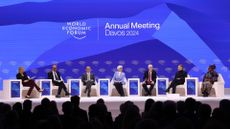Will interest rates come down again?
Rates have been frozen once again, raising hopes of a cut soon

The Bank of England has not increased interest rates since August 2023, raising hopes that the cost of borrowing may have peaked.
Rates were held at 5.25% for the fourth consecutive month at February’s meeting of the Bank's Monetary Policy Committee (MPC), while the latest Office for National Statistics data shows inflation rose slightly from 3.9% to 4% between November and December.
The Bank said there are signs "the restrictive stance of monetary policy is weighing on activity in the real economy and is leading to a looser labour market", so there was no current need to raise rates further.
Subscribe to The Week
Escape your echo chamber. Get the facts behind the news, plus analysis from multiple perspectives.

Sign up for The Week's Free Newsletters
From our morning news briefing to a weekly Good News Newsletter, get the best of The Week delivered directly to your inbox.
From our morning news briefing to a weekly Good News Newsletter, get the best of The Week delivered directly to your inbox.
While the freeze was expected by many, attention is now likely to turn to when interest rates will be cut.
Inflation remains at double the 2% target, said The Times Money Mentor, despite falling "significantly", which was the "main objective" of the interest rate rises.
Most analysts think rates have peaked, added the financial website, and will "soon start to fall".
What has the Bank said?
There was a split vote at the latest MPC meeting, with six members backing holding rates, two voting for a rise and one for a cut.
The single vote for a cut is a "powerful signal" that the central bank is getting closer to taking action, said The Guardian.
But the Bank's governor Andrew Bailey said: "We are not yet at a point where we can lower interest rates." The Bank has to be "more confident" that inflation is heading towards its 2% target, he said.
Bailey also warned the Treasury Select Committee in November that the markets are currently "underestimating" the "potential persistence" of inflation and its risks.
He had told a conference hosted by the Central Bank of Ireland in Dublin earlier that month that "it's really too early to be talking about cutting rates".
A "persistent barrier" to bringing down inflation is the "strong demand for workers, which is pushing wages higher", wrote The Guardian's Phillip Inman, and the "slow decline in food inflation" and "rise in the cost of services".
How will savers and mortgage holders be affected?
Higher interest rates and falling inflation means savings rates are more "competitive", said Moneyfacts.
More than 900 savings accounts currently beat inflation, added MoneyWeek, but you need to "grab these deals fast" as deals are often pulled from the market quickly.
There is also good news for homeowners, with major lenders cutting their mortgage pricing amid falling inflation and the freeze on the base rate.
Mortgage rates have fallen "significantly" since peaking at nearly 7% in August 2023, said Which? Some deals are priced at below 4% but the recent "surprise rise in inflation" and higher swap rates "may prevent mortgage rates from falling quickly", the consumer watchdog added.
What next?
The Bank's MPC will announce its next base rate decision on 21 March.
The Bank predicted in August that inflation would "continue to fall in 2024, and reach our 2% target by early 2025".
And "as soon as inflation is back under control", said The Times Money Mentor, "the Bank is likely to bring interest rates down".
Create an account with the same email registered to your subscription to unlock access.
Sign up for Today's Best Articles in your inbox
A free daily email with the biggest news stories of the day – and the best features from TheWeek.com
Marc Shoffman is an NCTJ-qualified award-winning freelance journalist, specialising in business, property and personal finance. He has a BA in multimedia journalism from Bournemouth University and a master’s in financial journalism from City University, London. His career began at FT Business trade publication Financial Adviser, during the 2008 banking crash. In 2013, he moved to MailOnline’s personal finance section This is Money, where he covered topics ranging from mortgages and pensions to investments and even a bit of Bitcoin. Since going freelance in 2016, his work has appeared in MoneyWeek, The Times, The Mail on Sunday and on the i news site.
-
 Liz Truss to save the West: is a political comeback really on the cards?
Liz Truss to save the West: is a political comeback really on the cards?Talking Point The former prime minister is back with a new tell-all memoir
By Richard Windsor, The Week UK Published
-
 Fallout: one of the 'most faithful – and best – video game adaptations'
Fallout: one of the 'most faithful – and best – video game adaptations'The Week Recommends This 'genre-bending' new Amazon series is set in a post-apocalyptic wilderness where survivors shelter below ground
By Adrienne Wyper, The Week UK Published
-
 'Test of faith for Trump Media's investors'
'Test of faith for Trump Media's investors'Today's Newspapers A roundup of the headlines from the US front pages
By The Week Staff Published
-
 How New York's legal cannabis rollout ended up in the weeds
How New York's legal cannabis rollout ended up in the weedsin depth And many of the state's promises to social equity applicants went up in smoke
By Theara Coleman, The Week US Published
-
 Feds cap credit card late fees at $8
Feds cap credit card late fees at $8speed read The Consumer Financial Protection Bureau finalized a rule to save households an estimated $10 billion a year
By Peter Weber, The Week US Published
-
 Nigeria's economic woes: what went wrong for African nation
Nigeria's economic woes: what went wrong for African nationUnder the radar President Tinubu is struggling to tackle soaring inflation after 'shock therapy' of ending fuel subsidies
By Richard Windsor, The Week UK Published
-
 Geopolitics and the economy in 2024
Geopolitics and the economy in 2024Talking Point The West is banking on a year of falling inflation. Don't rule out a shock
By The Week UK Published
-
 California's homelessness crisis just can't catch a break
California's homelessness crisis just can't catch a breakIn depth Recent data dispels a widespread theory for who's to blame
By Theara Coleman, The Week US Published
-
 How synthetic diamonds are upending the industry's status quo
How synthetic diamonds are upending the industry's status quoIn Depth Lab-grown diamonds are causing changes in a business that is already under heavy scrutiny
By Justin Klawans, The Week US Published
-
 How did America avoid a recession in 2023?
How did America avoid a recession in 2023?Today's Big Question A downturn was inevitable. Until it wasn't.
By Joel Mathis, The Week US Published
-
 Will the UK economy bounce back in 2024?
Will the UK economy bounce back in 2024?Today's Big Question Fears of recession follow warning that the West is 'sleepwalking into economic catastrophe'
By Chas Newkey-Burden, The Week UK Published